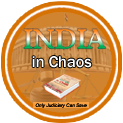Look Inside The Book
Genesis
Economic Social and Cultural Rights (ICESCR, 1966) and the International Covenant of Civil and Political Rights (ICCPR, 1966), etc. India is a signatory to all these. The fulfilment of basic objectives as defined in the Constitution, namely economic freedom, dignity, equality of status, opportunity, and fraternity are our fundamental rights.
Since they remain grossly unfulfilled by our guardians (the Legislature and the Executive), the onus now shifts to our third most responsible guardian, the Judiciary, to discharge these obligations by establishing responsible and accountable system of governances at the Union and States as prayed in Chapter 7 (p.214). This is the basic theme of the author’s present work.
The Judiciary is within its Constitutional bounds to do so.
Today the number of the impoverished alone has risen to more
than 116 crore which is more than three times that of India’s
population at the time of Independence (33–34 crore, Section 2.1
(p. 38)) As if India’s Independence was meant to produce illiterate
and destitute! According to the author, all the basic objectives are
easily achievable through responsible and accountable system
of governances at the Union and the States.
For better clarity to the readers on human rights and
implications of their violations, I have provided in Chapter 4 (p.
119) brief references to some vital human resource requirements
as promulgated by the United Nations (UN) to its member
countries. To augment the vital provisions, references of some
relevant statutes of a few worthy constitutions of the world are
also provided in Chapter 5 (p. 141). It is hoped the reader will
comprehend them and derive the inference that I want to convey.
CITATION</p>
M. Ananthasayanam Ayyangar, member of the Constituent
Assembly of India, and later Speaker of the Lok Sabha,
during a debate on the subject, described Article 32 (Right to
Constitutional Remedies) thus: “The Supreme Court, according to
me, is the supreme guardian of the citizen’s rights in any democracy.
I would even go further and say that it is the soul of democracy. The
elected Executive, which comes into being for the time-being, is apt
to abuse its powers, and therefore the Supreme Court must be there,
strong and untrammelled by the day-to-day passions which may
bring a set of people into power and also throw them out in a very
short time. If the fundamental rights of the individual are left to the
tender mercies of the government of the day, they cannot be called
fundamental rights at all,” and further that “these and other rights
must be carefully watched and for this purpose the Supreme Court
has been vested with the supreme ultimate, jurisdiction”. (Source:
Discussion on 9 December, 1949 in the Constituent Assembly
of India “on the scheme, object and enactment of Article 32 of
the Constitution”).
Note: Seemingly the learned member of the Constituent Assembly was
alluding to the fulfilment of fundamental rights enumerated under Part III
and Part IV of the Constitution by natural means and avenues to empower
the people to earn their living naturally and in a dignified manner and
not by demeaning them through handouts, dole-outs, or freebies, quotas
and reservations. And if the governments fumbled, the Judiciary must be
there undeterred and untrammelled to stop the dangerous regression and
dilapidation of the nation that such acts of governments may inflict.
— Author
Those who believe in the ‘Parliamentary Sovereignty’ rather than ‘Parliamentary Accountability’ neither know India’s Constitution nor want to honour it.








